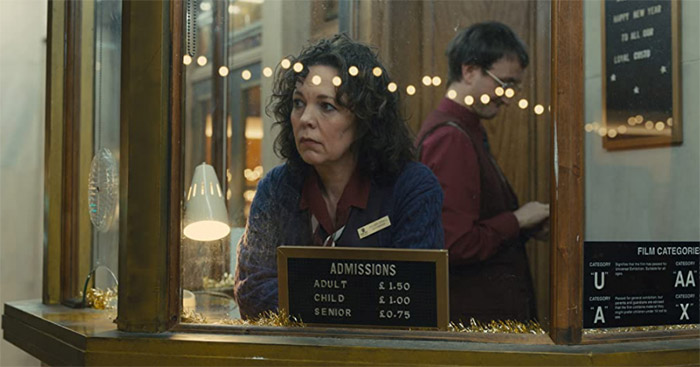Written and directed by Sam Mendes
Picturehouse, Liverpool
From 9th January 2023
Reviewed by Chris Doran
In Empire of Light, Sam Mendes has conjured a gorgeous image of what cinema was in its luxurious heyday: plush; golden; glamorous.
The theatre is beautifully shot from every angle, providing symmetrical and geometric backdrops to the drama as it slowly unfolds.
The out of season seaside setting is glimpsed through silhouettes of art deco windows and doors, complementing the melancholic mood and recalling (for some) the Smiths’ music video for Every day is like Sunday.
The action takes place in the early 80s and is infused with the music, politics, television, youth culture and social attitudes of the period. As one who saw it first-hand, I was looking for authenticity – and I found it.
The drama develops from the growing relationship between duty manager Hilary (Olivia Coleman), who leads a solitary life and has a history of mental illness, and Stephen (Michael Ward), a new employee whose ambition of going to university has been thwarted. Their shared experience of life on the margins and growing romance becomes a source of mutual support as they question their current lives and decisions: Hilary, her use of medication and sordid meetings with cinema manager (Colin Firth), and Stephen, his giving up on his dreams.
Meanwhile an interesting cast of fellow workers have some impact on them (though their back stories are only hinted at). These characters provide spirit-lifting friendship and practical help as does projectionist (Toby Jones). Later, Stephen’s mother (Tanya Moodie) and girlfriend are introduced: Tanya exemplifying a resilient single parent/NHS nurse working long shifts up against endemic racism.
Olivia Coleman’s powerful depiction of a woman suffering from mental illness is vivid and moving and Colin Firth in his lesser part is believably unpleasant as the middle-aged married chauvinist. Toby Jones could be the perfect heir to Peter Sellers in The Smallest show on Earth, a little sad, but passionate about his role and keeper of the hallowed projection room. Against these experienced actors, Michael Ward as Stephen adequately portrays a cocky young man, mixing sensitivity with justifiable anger in the face of racism.
Although the film is set in the early 80s, its themes remain relevant today as they were then: loneliness, racism, sexism, shaming, mental illness, dysfunctional relationships, adverse childhood experiences and the undervaluing of overworked NHS staff. Yes, there are that many themes (at least) and in 119 minutes of film, audiences are left with a mishmash of thoughts and unresolved feelings, like so many spools of film on the floor of the projection room, with not enough time to watch them and you don’t know the order they go in and how to operate the machine.
Visually and narratively, light and dark give the film depth. Scenes in semi-darkness are restful and intimate. These contrast with the bright lights and garishness of the reds and golds in the foyer, a public forum where possible tensions and dangers lie therein. We see a happy celebration of black and white skin on day out at the beach; fireworks bursting in the night sky and the light from the projector emanating like magic in the darkness of the theatre. On the cinema wall, a quotation from Shakespeare advises the audience to, “Find the light where darkness lies”. Poetry is important to Hilary who quotes from a couple of her favourites, Tennyson and Auden; firstly in intimate quiet darkness, later (to excruciating effect) in a spot-lit public event.
What I enjoyed most about this film was the beauty of the building framed against the sea and sky, and its convincing portrayal of loneliness, isolation and mental illness. Thankfully there are lighter moments and genuinely good and kindly characters. But it lacked the fun and excitement of movie-going and the movies themselves. When Chariots of Fire was announced I wanted to hear the music – but there was none: no music, no children, no rows of faces staring at the screen, no rustling of sweet papers. It just didn’t seem real.
